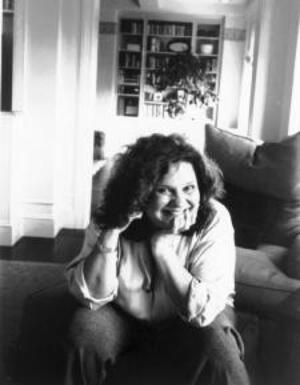Wendy Wasserstein: Center stage
I miss Wendy Wasserstein. How much so? Well, when Hillary Clinton announced she was running for president, my second thought—right after “All right!”—was: “What would Wendy say?”.
Wendy Wasserstein died of lymphoma in 2006, just one year shy of Hillary’s historic run. As Hillary faced issues of sexism that still exist (even among those who like to pretend they don’t) I imagined all the perceptive, intelligent things Wendy would have added to the national dialogue. Surely, she would have written a provocative, funny play, essay, book—or all three.
That was the thing about Wendy: I felt as if I knew her. So many others did, too. As is pointed out in JWA’s popular documentary film Making Trouble, complete strangers would often stop her on the street and start talking to her as if she were an old friend. But as it turns out, Wendy had some big secrets—ones she kept even from those closest to her. In her much-anticipated new book, Wendy and the Lost Boys: The Uncommon Life of Wendy Wasserstein, author Julie Salamon explores some of them, including Wendy’s tenuous relationship with her mother Lola, whose response to her daughter’s Pulitzer Prize win was “I’d be just as happy if she brought home a husband.”
Then there was the complicated Wasserstein family history. When Wendy was growing up, she had no idea that her father was not the father of her two older siblings. Lola had been married and widowed once before, but death was a verboten subject. One of her brothers was mentally challenged and pretty much shut out of the family. Wendy never even met him until she was nearly 50. Hers was a family consumed by an insatiable drive for success, coupled with a stifling edict to keep up appearances at all cost.
If Wendy always seemed insecure, now I know why. I met her several years ago when she was conducting a playwriting workshop with the Dramatist’s Guild. Of course, she spoke about her own writing process. She told us that whenever she finished a new play, she would give it first to one of her neighbors—who never failed to tell her how much she loved it.
I’ll never forget that. By this time, Wendy had won every award imaginable for The Heidi Chronicles, and her latest, The Sisters Rosensweig was a Broadway smash. Yet she still craved validation, regardless of whether it was sincere or not. Lots of writers—myself included—feel that way. But precious few of us admit it. Wendy had no problem with that. To her, vulnerability and honesty were intrinsically linked. Now that I know how “lost” Wendy really was, I just want to give her a hug. I’m sure Wendella (as friends often called her) would respond with one of her patented cackles—and hug me right back.
For an entertaining, insightful look at Wendy Wasserstein, along with Joan Rivers, Gilda Radner, Fanny Brice, Sophie Tucker and Molly Picon, check out JWA's groundbreaking film Making Trouble. You can watch the trailer here.







